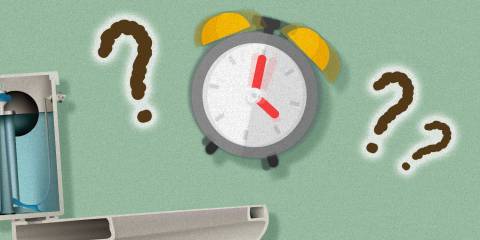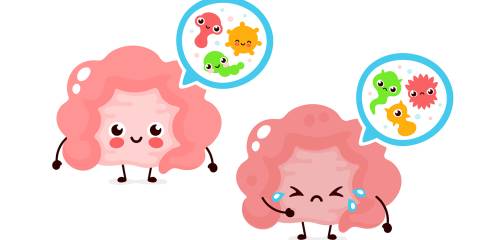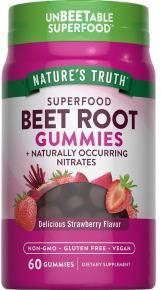The statistics are sobering: 16 out of every 100 adults have symptoms of constipation. Two thirds of Americans are living with digestive problems like bloating, gas, and abdominal pain. And it’s estimated that millions of Americans have gut dysbiosis or a gut imbalance that’s behind these uncomfortable symptoms.
What’s going on? Gut health starts with the food you’re eating, say experts. And the typical American diet does the gut no favors. For the millions of Americans experiencing gastrointestinal symptoms, a healthier balanced diet may offer relief.
Get Your Gut Back Into Balance
Here’s what scientists and researchers say can help restore gut health.
-
Get More Fiber
The typical American diet chock-full of processed foods is lacking in fiber, which may be the reason that 90 percent of Americans aren’t getting enough of this key nutrient. Therein lies the problem.
It’s fiber that keeps us regular and when fiber is digested, the gut makes something called short-chain fatty acids. These short-chain fatty acids are the main source of nutrition for colonic cells, and they help maintain a healthy gut barrier. Short-chain fatty acids also digest nutrients like carbohydrates and fat so they can be utilized by the body. These short-chain fatty acids have been shown to reduce inflammation in the body by supporting a healthy immune response.
How can Americans get more fiber? A plant-focused diet is key. Fruits and vegetables, as well as legumes, nuts, and seeds, are rich in fiber, not to mention health-promoting nutrients and antioxidants. Getting at least 5 to 7 servings of fruit and vegetables every day is recommended.
Meeting this daily quota, however, is not always easy for multi-tasking Americans, which is when supplementing with fiber can help. Daily Multi-Fiber is a clean fiber supplement that offers five sources of soluble and insoluble fiber as well as gut-friendly probiotics. It also comes in convenient, on-the-go single-serving packs.
-
Add in Probiotics
These good-for-you, live bacteria are essential to a healthy balanced gut. It's these beneficial bacteria that help to digest foods and quell the growth of harmful organisms that can throw the gut out of balance.
There are many things, however, that can suppress these beneficial bacteria in the gut: use of antibiotics, eating too many processed foods, and unhealthy lifestyle habits (i.e., lack of regular exercise, not getting enough sleep, and being chronically stressed).
There is something, though, that you can do: add beneficial bacteria back into the gut. Fermented foods are one of the best ways to do this. Yogurt, kefir, sauerkraut, kimchi, and other fermented foods contain good-for-you bacteria. Maple Hill Creamery’s Organic Grass-Fed Plain Kefir is one option. Fruits and vegetables are also good sources.
Getting enough of what the gut needs through food, however, can often be hard. This is where supplementing with probiotics comes in. NBPure’s Poobiotics contains five proven probiotic strains including four strains of Bifidobacterium (the main bacteria in the gut), as well as prebiotics that serve as food for beneficial bacteria and help form short-chain fatty acids.
-
Try Digestive Enzymes
If you’re developing gas or bloating after eating certain foods like yogurt or beans, you may lack enough of the enzymes to properly digest them. The body makes digestive enzymes to help break down food and absorb its nutrients. But reduced digestive enzymes in the gut can lead to gas, bloating, belching, and loose stools.
If you develop symptoms after eating certain foods, supplementing with digestive enzymes may help. Digestive Enzyme Complex contains 12 digestive enzymes including amylase, lipase, protease, and lactase (the enzyme that digests milk proteins). What's important to remember: take these enzymes with food as they need to be digested at the same time as food to work.
Taking baby steps to revitalize the gut will help relieve gastrointestinal symptoms. A healthy, balanced diet and a healthy lifestyle are always the first, most important steps. Supplementing, when necessary, may help relieve symptoms and result in a happier gut and a healthier you.





